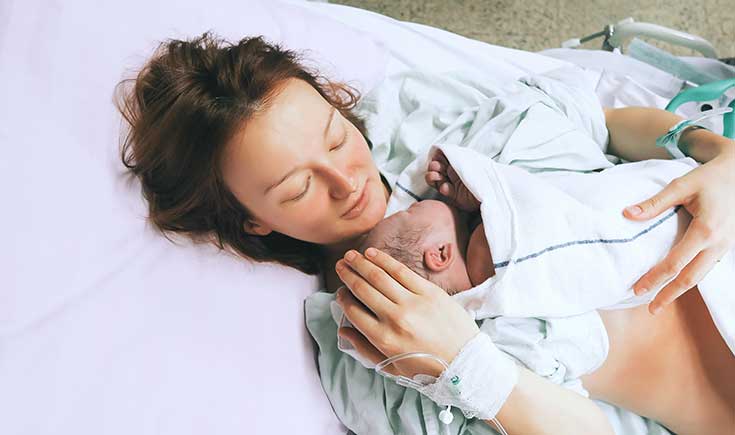

Pregnancy is a time of great joy for many women, but giving birth amidst a pandemic, most will be experiencing a deep sense of anxiety and fear. So, what can you expect if you will be giving birth in hospital? We answer all of your questions here about how the pandemic can impact labour, delivery, and your baby.
What to expect before delivery:
Is it safe to go for regular hospital prenatal checkups, or should we avoid the appointments?
It’s important that you see your doctor for regular checkups. But if you’re low risk, it’s up to you and your doctor if you’d prefer to space your appointments out more. Limit appointment times to 15 minutes, and you may also be able to schedule telehealth appointments.
Should I risk going to my GP clinic to get a flu shot and whooping cough vaccine?
Yes, it’s important to do whatever you and your family can to avoid getting sick. Getting the flu while pregnant can cause complications for you and your baby. After 20 weeks you should get the whooping cough vaccine to protect your baby from this highly infectious bacterial disease that can be life threatening.
I need someone to care for my other child/ren while my partner and I are in the hospital. What can I do?
Specialist Obstetrician and Gynaecologist Dr Brad Robinson’s advice is to put your support person/s, such as your parents, into isolation for at least two weeks prior to your due date, and not have contact with any other people. That will be the only way to limit your and your baby’s exposure. No visitors should be allowed in the home after the birth, since a baby’s immune system is immature and underdeveloped.
How does stress affect my pregnancy?
Stress is the normal human response to a situation like this, and won’t harm you or your baby. People throughout the ages have had babies through famines, world wars, poverty, and many more challenging times. The best thing you can do is not stress about stress.
What to expect in the hospital:
Are hospital staff being tested for COVID-19 before delivering babies?
No, but they are being screened. Health professionals can’t work if they’ve been overseas in the previous two weeks, or have been unwell.
Is there a nation-wide policy in regards to support persons during labour?
There is no national policy; it’s up to each hospital or state government, but you can absolutely have one support person with you, usually the partner.
Can my birth partner be refused to be present during the birth?
Unequivocally no. Partners cannot be denied, and that won’t change.
What is the evidence of vertical transmission?
At this point, there is no evidence that a pregnant woman can pass the virus onto her unborn baby.
If a mother has COVID-19 and gives birth, will she be separated from her baby?
Even if the baby is free of COVID-19, the mother and baby will not be separated. The baby is at risk of contracting it, but since the mother would have been building up antibodies to fight the virus, those antibodies would have been transferred to the baby. So, it’s hoped the baby will have a degree of natural protection against the virus. The mother would need to take extra precautions when caring for her baby. Frequent handwashing, potentially wearing a mask, and practicing good hygiene.
Are newborns more at risk than others?
Newborns are vulnerable in that they don’t have a good immune system, but antibodies from their mother would have been transferred to them. If you choose to or can breastfeed, it’s recommended that you do so to further protect your baby’s immune system.
How are newborn babies being tested for COVID-19?
Via nasal swabbing.
What if my baby contracts COVID-19 during the hospital stay?
From the evidence around the world, babies and young children are affected only mildly or moderately. Your baby would be carefully and closely monitored in the hospital, and most likely will stay with you in the room.
Can I have visitors in the hospital after the baby is born?
This varies between states and hospitals, so speak to your hospital staff for more information.
Is it possible to leave the hospital earlier if I feel okay after delivery?
You can if you are up to it, and your midwife or doctor approves. Women giving birth in public hospitals may be discharged in as little as four hours in a move aimed at protecting new mothers and babies.
Should I consider a home birth to avoid contracting the virus?
The Royal Australian and New Zealand College of Obstetricians and Gynaecologists (RANZCOG) president Vijay Roach says a hospital or birthing unit is the safest place to give birth.
What is important then is that the postnatal care continues, either by phone, video-link, or in person when needed.
Sources:
The Royal Australian and New Zealand College of Obstetricians and Gynaecologists























